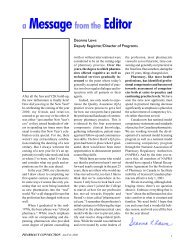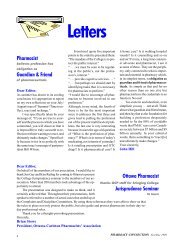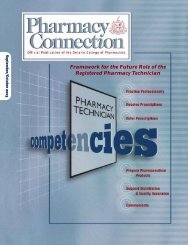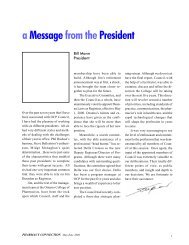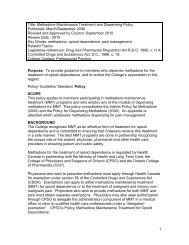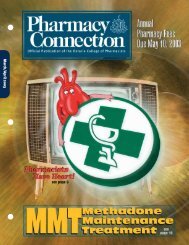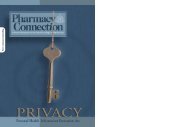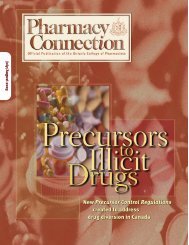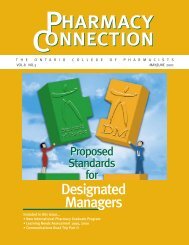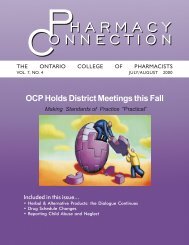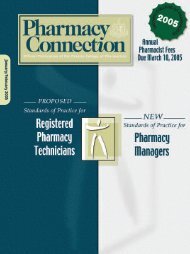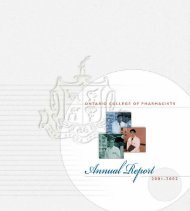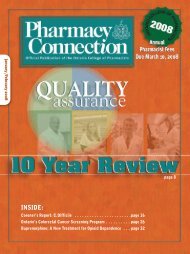January/February 2009 - Ontario College of Pharmacists
January/February 2009 - Ontario College of Pharmacists
January/February 2009 - Ontario College of Pharmacists
Create successful ePaper yourself
Turn your PDF publications into a flip-book with our unique Google optimized e-Paper software.
deciding on discipline<br />
Case 1<br />
Member found guilty <strong>of</strong> an <strong>of</strong>fence<br />
relevant to his suitability to practise<br />
Member: Roger Demers<br />
Hearing Date: October 8, 2008<br />
Facts<br />
The <strong>College</strong> commenced an investigation<br />
into the Member’s conduct after<br />
learning that the Member may have<br />
been charged with a criminal <strong>of</strong>fence.<br />
Through subsequent inquiries, the <strong>College</strong><br />
learned that in or about July 2004,<br />
the Member had been charged with<br />
possessing child pornography. Through<br />
his counsel, the Member cooperated<br />
with the <strong>College</strong> concerning the criminal<br />
proceedings.<br />
In an Agreed Statement <strong>of</strong> Facts<br />
with the Crown, the Member admitted<br />
to having used his home computer<br />
to purchase access to three different<br />
websites on three separate occasions in<br />
April 2002, April 2003, and June 2003,<br />
which websites contained child pornography<br />
as defined by the Criminal<br />
Code <strong>of</strong> Canada. He further admitted<br />
to having accessed additional child pornography<br />
websites during the period<br />
March 8, 2000 to July 28, 2004, and<br />
to having in his possession at his home<br />
10 printed images and 34 electronic images<br />
<strong>of</strong> child pornography. The Member<br />
pleaded guilty to the charge <strong>of</strong> possession<br />
<strong>of</strong> child pornography and was<br />
sentenced in criminal court.<br />
The discipline hearing proceeded<br />
by way <strong>of</strong> Agreed Statement <strong>of</strong> Facts<br />
and Joint Submission on Penalty. The<br />
Member admitted that he had committed<br />
acts <strong>of</strong> pr<strong>of</strong>essional misconduct,<br />
namely that he had been found guilty<br />
<strong>of</strong> an <strong>of</strong>fence relevant to his suitability<br />
to practise, and that he had engaged in<br />
conduct or performed an act relevant<br />
to the practice <strong>of</strong> pharmacy that, having<br />
regard to all the circumstances,<br />
would reasonably be regarded by members<br />
<strong>of</strong> the pr<strong>of</strong>ession as disgraceful,<br />
dishonourable or unpr<strong>of</strong>essional.<br />
The Joint Submission on Penalty included<br />
a reprimand, a suspension <strong>of</strong> the<br />
Member’s Certificate <strong>of</strong> Registration<br />
for two months to be served in two<br />
one-month blocks, and costs <strong>of</strong> $4,500<br />
to the <strong>College</strong>. The Joint Submission<br />
also included certain terms, conditions<br />
and limitations on the Member’s Certificate<br />
<strong>of</strong> Registration with respect to<br />
providing current and future employers<br />
with the Discipline Panel’s decision.<br />
Decision and Reasons<br />
The Discipline Panel found this case<br />
to be very challenging when it came<br />
to crafting a penalty. This is a case<br />
that underscores that a pharmacist’s<br />
behaviour outside <strong>of</strong> the place <strong>of</strong> employment<br />
is integrally connected to his<br />
or her pr<strong>of</strong>essional standing in the community<br />
and in the pr<strong>of</strong>ession. The circumstances<br />
<strong>of</strong> the Member’s conduct<br />
are troubling, but the Panel believed<br />
the Member is paying his dues in regards<br />
to the criminal process. In the<br />
pr<strong>of</strong>essional disciplinary context, his<br />
misconduct does not go to his fitness<br />
to practise pharmacy on a technical or<br />
skills based level, but rather his moral<br />
fitness to hold himself out as a pr<strong>of</strong>essional<br />
pharmacist. The Panel could not<br />
simply order course work, order a suspension<br />
and impose a fine as a means<br />
to protect the public, and trust that the<br />
Member will not re<strong>of</strong>fend. Rather, the<br />
Panel’s focus in protection <strong>of</strong> the public<br />
was perhaps even more heightened<br />
than in more typical discipline cases.<br />
The Panel had two problems with<br />
the Joint Submission on Penalty. The<br />
Panel was acutely aware <strong>of</strong> the overwhelming<br />
body <strong>of</strong> case law directing it<br />
to accept Joint Submissions, but did not<br />
feel it could do so in this case without<br />
implementing greater protections for<br />
the public. To the credit <strong>of</strong> the Member,<br />
the <strong>College</strong> and their respective<br />
counsel, the Panel was able to raise its<br />
concerns at the hearing, and the parties<br />
were able to come up with a suitable<br />
additional term to further protect<br />
the public.<br />
The Panel was concerned about<br />
members <strong>of</strong> the public learning, after the<br />
fact, that the Member, as their pharmacist,<br />
may have been counselling their children<br />
on prescriptions given the nature<br />
<strong>of</strong> the Member’s criminal conduct. Accordingly,<br />
the Panel proposed that the<br />
Joint Submission be amended to include<br />
a term that the Member would not counsel<br />
patients under the age <strong>of</strong> 18 without<br />
an adult being present during that counselling,<br />
with the Panel’s preference being<br />
that the other adult be a member <strong>of</strong><br />
the pr<strong>of</strong>essional staff <strong>of</strong> the pharmacy.<br />
When attendance by another pr<strong>of</strong>essional<br />
staff member was not possible, the<br />
Panel expected the Member to pursue<br />
alternative methods, such as counselling<br />
by telephone, or the patient reattending<br />
another day for counselling.<br />
The Panel was also concerned that<br />
the proposed suspension was to be<br />
broken up into two blocks <strong>of</strong> time, to<br />
accommodate some scheduling difficulties<br />
<strong>of</strong> the owner/Designated Manager<br />
<strong>of</strong> the pharmacy in which the Member<br />
was employed. Without being disrespectful<br />
to the pharmacy owner, the<br />
20 pharmacyconnection • <strong>January</strong>/<strong>February</strong> <strong>2009</strong>



